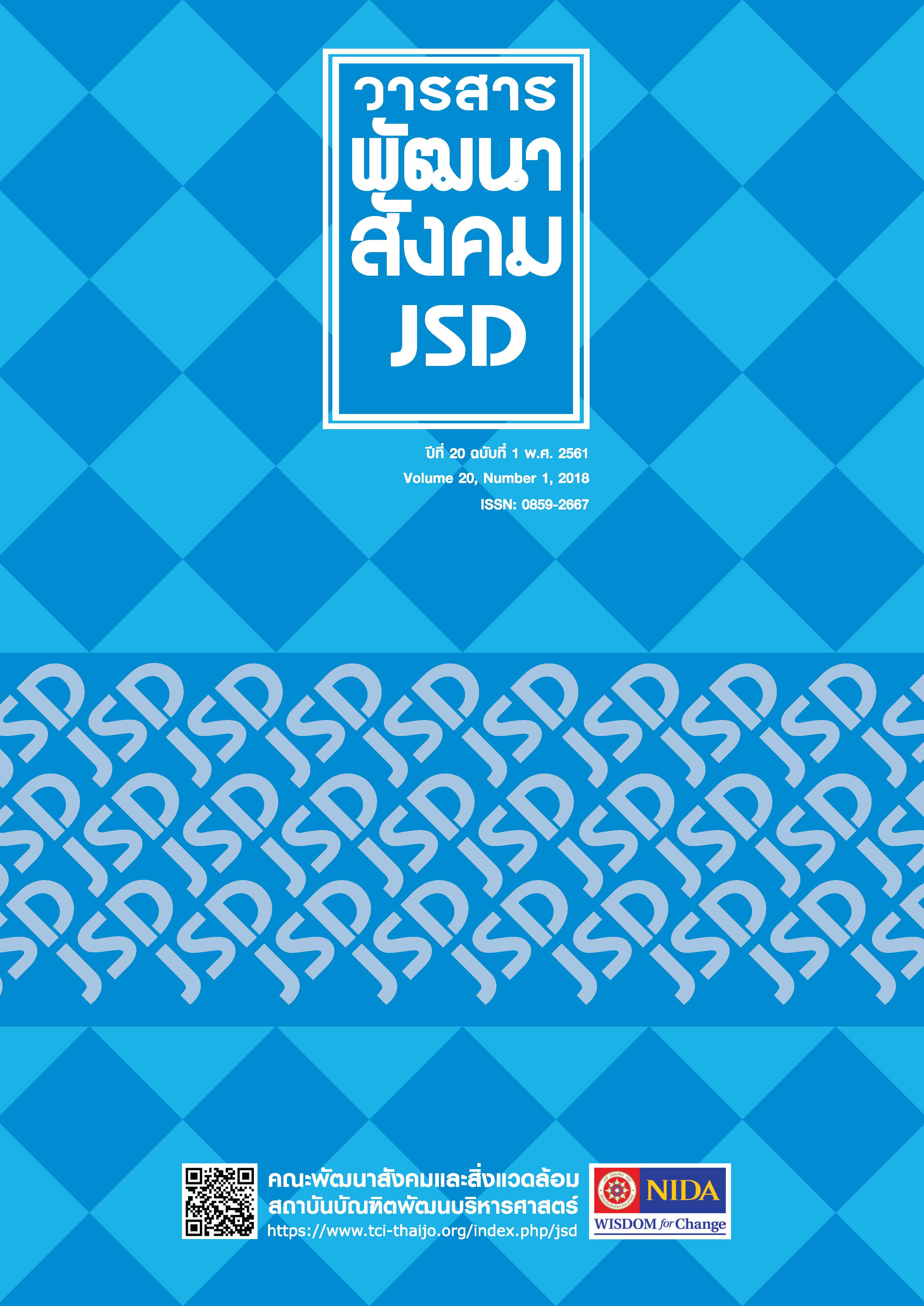Community Forest Management Based on New Public Governance in the East
Main Article Content
Abstract
The objectives of this research article are to study the factor of new public governance influencing the success of community forests and create “an appropriate model” for community forest management in the East. The quantitative and qualitative research methods were used for the study. The research found that the factors influencing the success of the community forest are new public governance and public leadership. The appropriate model for community forest management is composed of the cooperation between the community members as the key partner and other supporting parties including government officials, schools, monasteries, network of community forests, NGOs, business sectors etc. Additional recommendations are to promote public leadership, soft system of joint consultation, dialogue, indirect monitoring of forestry officials, social capital, support of the value of natural conservation and effective conflict management.
Article Details
References
2. Bovaird, T. & Loffler, E. (2005) ‘Understanding Public Management and Governance’, in Bovaird, T. & Loffler, E. (eds.) Public Management and Governance. London: Taylor & Francis Group.
3. Broussine, M. (2005) “Public Leadership”, in Bovaird, T. & Loffler, E. (eds.) Public Management and Governance. London: Taylor & Francis Group.
4. Cheema, G. (2005) From Public Administration to Governance: The Paradigm Shift in the Link
between Government and Citizens, Paper presented at the 6th Global Forum on Reinventing Government towards Participatory and Transparent Governance on 24-27 May 2005, Seoul.
5. Community Forest Management Bureau (2014) Conclusion of Community Forestry Projects being Approved [in Thai]. Retrieved from
6. Crosby, B., Bryson, J. & Stone, M. (2010) ‘Leading Across Frontiers: How Visionary Leaders Integrate People, Processes, and Resources’, in The New Public Governance?: Emerging Perspectives on the Theory and Practice of Public Governance, Osborne, S. (ed.), London: Routledge.
7. Dyer, W. G., Dyer, J. H. & Dyer, W. G. (2013) Team Building: Proven Strategies for Improving Team Performance, San Francisco: Jossey-Bass.
8. Flyvbjerg, B. (2001) Making Social Science Matter: Why Social Inquiry Fails and How It Can Succeed Again, Cambridge: Cambridge University Press.
9. Kennett, P. (2010) “Global Perspectives on Governance” in Osborne, S. P. (ed.) The New Public Governance?: Emerging Perspectives on the Theory and Practice of Public Governance, London: Routledge.
10. Samukkethum, S. (2010) Conflict Management and Public Participation, [in Thai]. Bangkok: Public Administration Program, Krirk University.
11. Osborne, S. (2010) “Introduction: The (New) Public Governance: A Suitable Case for Treatment?”, in
S. Osborne (ed.) The New Public Governance?: Emerging Perspectives on the Theory and Practice of Public Governance, London: Routledge,.
12. Pestoff, V. & Brandsen, T. (2010) “Public Governance and the Third Sector: Opportunities for Co-production and Innovation?”, In Osborne, S. (ed.) The New Public Governance?: Emerging Perspectives on the Theory and Practice of Public Governance, London: Routledge.
13. Pestorff, V. (2010) New Public Governance, Co-production & Third Sector Social Services, Institution of Civil Society Studies, Ersta Skondal University College, Stockholm, Sweden.
14. Peters, B. (2010) “Meta-governance and Public Management”, In Osborne, S. P. (ed.) The New Public Governance?: Emerging Perspectives on the Theory and Practice of Public Governance, London: Routledge.
15. Phanthasen, A. (1996) Development of Thai Rural Soceity: Hope, Way Out, and New Alternative, [in Thai]. Bangkok: Thailand Research Fund.
16. Phinkaew, P. (2004) Survey on Social and Economic Conditions of the People living Near Community Forests: A Case Study of Baan Laeng Community Forest in Rayong Province, [in Thai] Community Forest Management Bureau, Forestry Department, Thailand.
17. Putnam, R. (2002) Democracies in Flux: The Evolution of Social Capital in Contemporary Society, Oxford: Oxford University Press.
18. Rajchagool, C. (1994) The Rise and Fall of the Thai Absolute Monarchy, Bangkok: White Lotus.
19. Wankaew, et al., (2007) The Sociology of Sunami: Disaster Management System, [in Thai]. Bangkok: Office of Health Promotion Fund.

